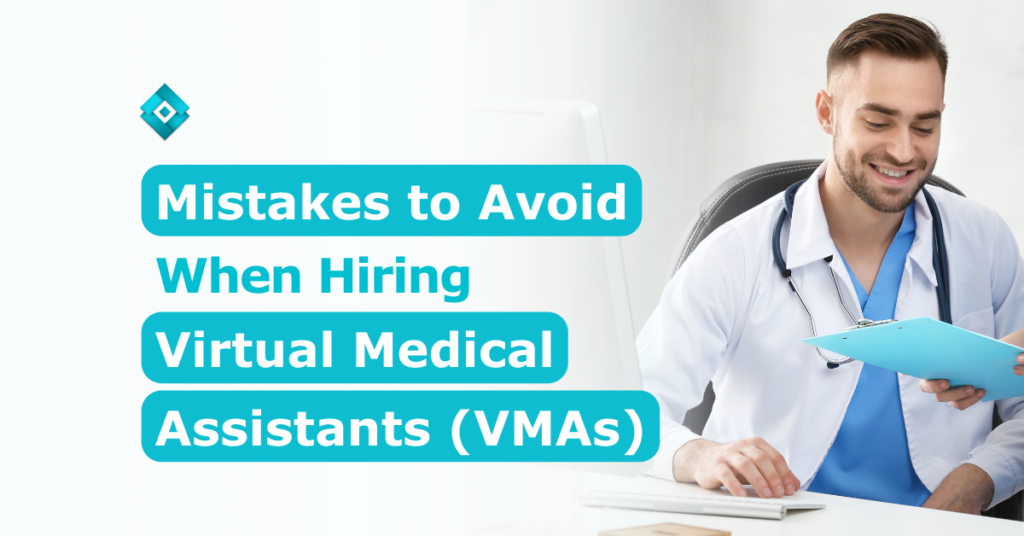Why do employers make mistakes when hiring virtual medical assistants?
Hiring a virtual medical assistant (VMA) is a big decision for any employer. After all, the VMA will be responsible for handling sensitive medical information and providing support to patients. Choosing a VMA who is well-qualified and will be a good fit for the organization is crucial. Unfortunately, employers sometimes make mistakes when hiring VMAs. This can happen for various reasons, including rushing the hiring process, not taking the time to screen candidates properly, or simply being unaware of the qualifications necessary for the job. As a result, employers may end up with a VMA who is not well-suited for the position. This can cause problems down the line, so it is essential to take caution when hiring a VMA. You’ll be one step ahead by taking the initial step of knowing the common mistakes when hiring virtual medical assistants.
Here are the common mistakes when hiring Virtual Medical Assistants.
1. Hiring a VMA with no medical background
One of the mistakes when hiring virtual medical assistants is opting for a VMA with no medical background. Although this may seem like a good idea initially, it can lead to more problems down the road. Without a medical background, the VMA will not be able to understand and apply the knowledge necessary to provide adequate care. In addition, they may also be less likely to maintain a professional demeanor when interacting with patients.
Also, while it is certainly possible to find reliable and competent VMAs without a medical degree, the truth is that working with someone who is not familiar with medical terminology and processes can be time-consuming. Not only will you have to spend extra time training your VMA, but you may also find that they make mistakes more often than someone with a medical background. Lastly, if you ever need to ask your VMA for advice or assistance, you may not get the level of expertise that you need. For these reasons, hiring a VMA with at least some medical experience is always best.
2. Not correctly vetting an applicant
Thoroughly vetting each applicant means conducting a thorough background check and verifying their credentials. It also means taking the time to get to know them as a person to ensure that they’re someone you can trust. Unfortunately, many employers make the mistake of rushing through the hiring process. As a result, they end up hiring someone who does not really have the right qualifications.
There are a few steps that businesses can take to vet applicants more effectively:
- Don’t rush through the hiring process.
- Companies should check references and credentials.
- Conduct a specific skills test to assess applicants’ ability to perform their tasks.
- Have a detailed interview to ensure the applicant is a good fit for the position.
By taking these steps, a medical practice can decrease its chance of committing these mistakes when hiring virtual medical assistants. Consequently, this increases their chances of hiring a qualified and competent virtual medical assistant.
3. Not properly onboarding the VMA
When you don’t take the time to properly onboard your VMA, they can’t be as effective as they could be. They won’t know your systems, processes, or how you want things done. As a result, they’ll likely make mistakes that will cost your business time and money. With this, another slip that can happen is not correctly explaining the expectations of the role. Just because your VMA will be working remotely doesn’t mean they don’t need to know what you expect of them regarding hours, tasks, and deadlines.
Furthermore, not thoroughly onboarding your VMA can lead to a high turnover rate, as VMAs who feel undervalued or unsupported are more likely to leave. This situation can cost the business 100-300% of the employee’s salary. To avoid these mistakes when hiring virtual medical assistants, be sure to spend sufficient time onboarding your VMA.
Read: 5 Proven Tips To Onboard Remote Employees
4. Choosing a VMA who’s not ready for a remote work
One of the mistakes that some employers make when hiring virtual medical assistants (VMA) is assuming that all VMAs are used to working remotely. However, this isn’t always the case. Some VMAs may have only recently transitioned to working from home and may not be familiar with all the available communication tools and technologies. As a result, they may have difficulty communicating with their employers and make mistakes that cause frustration and a less productive work environment. If you’re thinking about hiring a VMA, be sure to ask about their experience working remotely. It’s also a good idea to set up a brief training period so your VMA can learn about the software and program that your clinic use. Doing so will help to ensure a more productive and enjoyable work relationship.
5. Absence of planning for the VMA’s work
Doing so will give you visibility into every aspect of the project and help you identify areas where your team is excelling or struggling. You can also use project management tools to create reports showing your team’s progress over time. This can be extremely helpful in demonstrating your team’s progress to stakeholders. Ultimately, leveraging project management tools is essential for any project manager who wants to be successful.
Avoid these mistakes when hiring Virtual Medical Assistants by choosing Core!
Choosing the right virtual medical assistant is crucial to the success of your medical practice. To avoid these mistakes, choose the most preferred and trusted VMA agency like us. With our HIPAA-compliant VMAs who have been well versed in the medical field, you can rest assured that you’ll make the right choice. Discuss your future with Core by booking a free discovery call with our industry experts!









